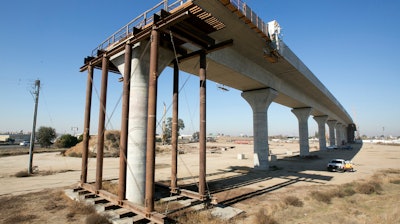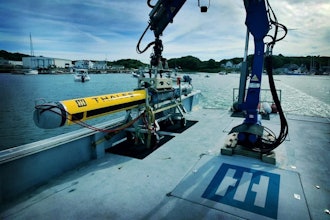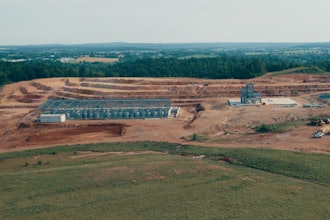
California sued Tuesday to block the Trump administration from cancelling nearly $1 billion for the state's high-speed rail project, escalating the state's feud with the federal government.
The Federal Railroad Administration announced last week it would not give California the money awarded by Congress nearly a decade ago, arguing that the state has not made enough progress on the project.
The state must complete construction on a segment of track in the Central Valley agricultural heartland by 2022 to keep the money, and the administration has argued the state cannot meet that deadline. That line of track would be the first built on what the state hopes will eventually become a 520-mile (837-kilometer) line between San Francisco and Los Angeles.
But Democratic Gov. Gavin Newsom says the move is retribution for California's criticism of President Donald Trump's immigration policies.
"The decision was precipitated by President Trump's overt hostility to California, its challenge to his border wall initiatives, and what he called the "green disaster" high-speed rail project," the state said in the lawsuit.
California was not expected to tap the $929 million the Trump administration has revoked until 2021. If the lawsuit is not resolved before then, the election could put Democrats in the White House and Congress who may be friendlier to the project.
The lawsuit faulted the Trump administration for halting cooperation with the state on granting environmental clearances for the project. It said terminating the funding would "wreak significant economic damage on the Central Valley and the state."
Newsom told reporters the administration is "after us in every way, shape or form." But he expressed confidence the state will win in court.
"Principles and values tend to win out over short-term tweets," Newsom said.
The lawsuit highlighted a series of tweets Trump sent about the project, including one that said California's rail project would be far more expensive than Trump's proposed border wall.
That tweet came a day after California led 15 states in suing over Trump's plans to fund the border wall, and hours before the administration first threatened to revoke the rail funding.
The Federal Railroad Administration did not immediately respond to an email message seeking comment about California's lawsuit.
California has worked for more than a decade on the project to bring high-speed rail service between Los Angeles and San Francisco, but the project has been plagued by delays and cost overruns. It's now projected to cost around $77 billion and be finished by 2033.
The state has already spent $2.5 billion in federal funding, and the Trump administration is exploring whether it can try to get that money back.
The lawsuit also asks the court to block the administration from awarding the money to any other project.
The lawsuit was filed in the Northern District of California.
The dispute over the funding was partly driven by Newsom's remarks in February that the project faced challenges and needed to shift focus. Rail officials had been planning to connect the line under construction in the Central Valley to Silicon Valley, but Newsom has proposed extending the line further north and south into the valley before heading west.
The California High-Speed Rail Authority presented a plan in early May that showed it would cost $18.3 billion to get trains up and running between Bakersfield and Merced by 2028.
The board overseeing the project voted Tuesday to further study whether it makes sense financially and otherwise to run early train service on that line. Tom Richards, the vice chairman, noted the board has not yet formally approved the new approach.
"The board has not been asked for, nor has the board given, any interim service direction to (the project's) management," he said.





















